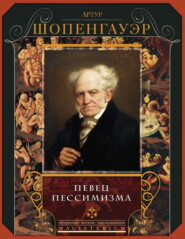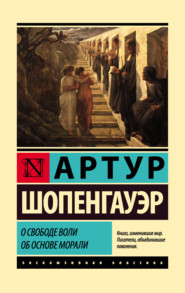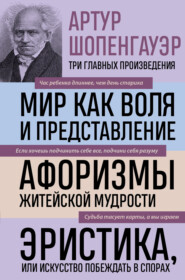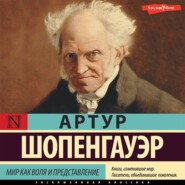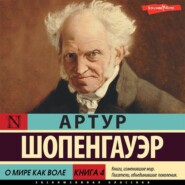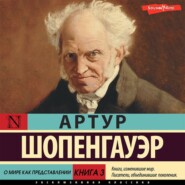По всем вопросам обращайтесь на: info@litportal.ru
(©) 2003-2024.
✖
Essays of Schopenhauer
Настройки чтения
Размер шрифта
Высота строк
Поля
Therefore all who think for themselves hold at bottom much the same views; when they differ it is because they hold different points of view, but when these do not alter the matter they all say the same thing. They merely express what they have grasped from an objective point of view. I have frequently hesitated to give passages to the public because of their paradoxical nature, and afterwards to my joyful surprise have found the same thoughts expressed in the works of great men of long ago.
The book-philosopher, on the other hand, relates what one man has said and another man meant, and what a third has objected to, and so on. He compares, weighs, criticises, and endeavours to get at the truth of the thing, and in this way resembles the critical historian. For instance, he will try to find out whether Leibnitz was not for some time in his life a follower of Spinoza, etc. The curious student will find striking examples of what I mean in Herbart's Analytical Elucidation of Morality and Natural Right, and in his Letters on Freedom. It surprises us that such a man should give himself so much trouble; for it is evident that if he had fixed his attention on the matter he would soon have attained his object by thinking a little for himself.
But there is a small difficulty to overcome; a thing of this kind does not depend upon our own will. One can sit down at any time and read, but not – think. It is with thoughts as with men: we cannot always summon them at pleasure, but must wait until they come. Thought about a subject must come of its own accord by a happy and harmonious union of external motive with mental temper and application; and it is precisely that which never seems to come to these people.
One has an illustration of this in matters that concern our personal interest. If we have to come to a decision on a thing of this kind we cannot sit down at any particular moment and thrash out the reasons and arrive at a decision; for often at such a time our thoughts cannot be fixed, but will wander off to other things; a dislike to the subject is sometimes responsible for this. We should not use force, but wait until the mood appears of itself; it frequently comes unexpectedly and even repeats itself; the different moods which possess us at the different times throwing another light on the matter. It is this long process which is understood by a ripe resolution. For the task of making up our mind must be distributed; much that has been previously overlooked occurs to us; the aversion also disappears, for, after examining the matter closer, it seems much more tolerable than it was at first sight.
And in theory it is just the same: a man must wait for the right moment; even the greatest mind is not always able to think for itself at all times. Therefore it is advisable for it to use its spare moments in reading, which, as has been said, is a substitute for one's own thought; in this way material is imported to the mind by letting another think for us, although it is always in a way which is different from our own. For this reason a man should not read too much, in order that his mind does not become accustomed to the substitute, and consequently even forget the matter in question; that it may not get used to walking in paths that have already been trodden, and by following a foreign course of thought forget its own. Least of all should a man for the sake of reading entirely withdraw his attention from the real world: as the impulse and temper which lead one to think for oneself proceed oftener from it than from reading; for it is the visible and real world in its primitiveness and strength that is the natural subject of the thinking mind, and is able more easily than anything else to rouse it. After these considerations it will not surprise us to find that the thinking man can easily be distinguished from the book-philosopher by his marked earnestness, directness, and originality, the personal conviction of all his thoughts and expressions: the book-philosopher, on the other hand, has everything second-hand; his ideas are like a collection of old rags obtained anyhow; he is dull and pointless, resembling a copy of a copy. His style, which is full of conventional, nay, vulgar phrases and current terms, resembles a small state where there is a circulation of foreign money because it coins none of its own.
* * * * *
Mere experience can as little as reading take the place of thought. Mere empiricism bears the same relation to thinking as eating to digestion and assimilation. When experience boasts that it alone, by its discoveries, has advanced human knowledge, it is as though the mouth boasted that it was its work alone to maintain the body.
The works of all really capable minds are distinguished from all other works by a character of decision and definiteness, and, in consequence, of lucidity and clearness. This is because minds like these know definitely and clearly what they wish to express – whether it be in prose, in verse, or in music. Other minds are wanting in this decision and clearness, and therefore may be instantly recognised.
The characteristic sign of a mind of the highest standard is the directness of its judgment. Everything it utters is the result of thinking for itself; this is shown everywhere in the way it gives expression to its thoughts. Therefore it is, like a prince, an imperial director in the realm of intellect. All other minds are mere delegates, as may be seen by their style, which has no stamp of its own.
Hence every true thinker for himself is so far like a monarch; he is absolute, and recognises nobody above him. His judgments, like the decrees of a monarch, spring from his own sovereign power and proceed directly from himself. He takes as little notice of authority as a monarch does of a command; nothing is valid unless he has himself authorised it. On the other hand, those of vulgar minds, who are swayed by all kinds of current opinions, authorities, and prejudices, are like the people which in silence obey the law and commands.
* * * * *
The people who are so eager and impatient to settle disputed questions, by bringing forward authorities, are really glad when they can place the understanding and insight of some one else in the field in place of their own, which are deficient. Their number is legion. For, as Seneca says, "Unusquisque mavult credere, quam judicare."
The weapon they commonly use in their controversies is that of authorities: they strike each other with it, and whoever is drawn into the fray will do well not to defend himself with reason and arguments; for against a weapon of this kind they are like horned Siegfrieds, immersed in a flood of incapacity for thinking and judging. They will bring forward their authorities as an argumentum ad verecundiam and then cry victoria.
* * * * *
In the realm of reality, however fair, happy, and pleasant it may prove to be, we always move controlled by the law of gravity, which we must be unceasingly overcoming. While in the realm of thought we are disembodied spirits, uncontrolled by the law of gravity and free from penury.
This is why there is no happiness on earth like that which at the propitious moment a fine and fruitful mind finds in itself.
* * * * *
The presence of a thought is like the presence of our beloved. We imagine we shall never forget this thought, and that this loved one could never be indifferent to us. But out of sight out of mind! The finest thought runs the risk of being irrevocably forgotten if it is not written down, and the dear one of being forsaken if we do not marry her.
* * * * *
There are many thoughts which are valuable to the man who thinks them; but out of them only a few which possess strength to produce either repercussion or reflex action, that is, to win the reader's sympathy after they have been written down. It is what a man has thought out directly for himself that alone has true value. Thinkers may be classed as follows: those who, in the first place, think for themselves, and those who think directly for others. The former thinkers are the genuine, they think for themselves in both senses of the word; they are the true philosophers; they alone are in earnest. Moreover, the enjoyment and happiness of their existence consist in thinking. The others are the sophists; they wish to seem, and seek their happiness in what they hope to get from other people; their earnestness consists in this. To which of these two classes a man belongs is soon seen by his whole method and manner. Lichtenberg is an example of the first class, while Herder obviously belongs to the second.
* * * * *
When one considers how great and how close to us the problem of existence is, – this equivocal, tormented, fleeting, dream-like existence – so great and so close that as soon as one perceives it, it overshadows and conceals all other problems and aims; – and when one sees how all men – with a few and rare exceptions – are not clearly conscious of the problem, nay, do not even seem to see it, but trouble themselves about everything else rather than this, and live on taking thought only for the present day and the scarcely longer span of their own personal future, while they either expressly give the problem up or are ready to agree with it, by the aid of some system of popular metaphysics, and are satisfied with this; – when one, I say, reflects upon this, so may one be of the opinion that man is a thinking being only in a very remote sense, and not feel any special surprise at any trait of thoughtlessness or folly; but know, rather, that the intellectual outlook of the normal man indeed surpasses that of the brute, – whose whole existence resembles a continual present without any consciousness of the future or the past – but, however, not to such an extent as one is wont to suppose.
And corresponding to this, we find in the conversation of most men that their thoughts are cut up as small as chaff, making it impossible for them to spin out the thread of their discourse to any length. If this world were peopled by really thinking beings, noise of every kind would not be so universally tolerated, as indeed the most horrible and aimless form of it is.[12 - See Essay on Noise, p. 28.] If Nature had intended man to think she would not have given him ears, or, at any rate, she would have furnished them with air-tight flaps like the bat, which for this reason is to be envied. But, in truth, man is like the rest, a poor animal, whose powers are calculated only to maintain him during his existence; therefore he requires to have his ears always open to announce of themselves, by night as by day, the approach of the pursuer.
SHORT DIALOGUE ON
THE INDESTRUCTIBILITY OF OUR TRUE BEING BY DEATH
Thrasymachos. Tell me briefly, what shall I be after my death? Be clear and precise.
Philalethes. Everything and nothing.
Thras. That is what I expected. You solve the problem by a contradiction. That trick is played out.
Phil. To answer transcendental questions in language that is made for immanent knowledge must assuredly lead to a contradiction.
Thras. What do you call transcendental knowledge, and what immanent? It is true these expressions are known to me, for my professor used them, but only as predicates of God, and as his philosophy had exclusively to do with God, their use was quite appropriate. For instance, if God was in the world, He was immanent; if He was somewhere outside it, He was transcendent. That is clear and comprehensible. One knows how things stand. But your old-fashioned Kantian doctrine is no longer understood. There has been quite a succession of great men in the metropolis of German learning —
Phil. (aside). German philosophical nonsense!
Thras.– such as the eminent Schleiermacher and that gigantic mind Hegel; and to-day we have left all that sort of thing behind, or rather we are so far ahead of it that it is out of date and known no more. Therefore, what good is it?
Phil. Transcendental knowledge is that which, going beyond the boundary of possible experience, endeavours to determine the nature of things as they are in themselves; while immanent knowledge keeps itself within the boundary of possible experience, therefore it can only apply to phenomena. As an individual, with your death there will be an end of you. But your individuality is not your true and final being, indeed it is rather the mere expression of it; it is not the thing-in-itself but only the phenomenon presented in the form of time, and accordingly has both a beginning and an end. Your being in itself, on the contrary, knows neither time, nor beginning, nor end, nor the limits of a given individuality; hence no individuality can be without it, but it is there in each and all. So that, in the first sense, after death you become nothing; in the second, you are and remain everything. That is why I said that after death you would be all and nothing. It is difficult to give you a more exact answer to your question than this and to be brief at the same time; but here we have undoubtedly another contradiction; this is because your life is in time and your immortality in eternity. Hence your immortality may be said to be something that is indestructible and yet has no endurance – which is again contradictory, you see. This is what happens when transcendental knowledge is brought within the boundary of immanent knowledge; in doing this some sort of violence is done to the latter, since it is used for things for which it was not intended.
Thras. Listen; without I retain my individuality I shall not give a sou for your immortality.
Phil. Perhaps you will allow me to explain further. Suppose I guarantee that you will retain your individuality, on condition, however, that you spend three months in absolute unconsciousness before you awaken.
Thras. I consent to that.
Phil. Well then, as we have no idea of time when in a perfectly unconscious state, it is all the same to us when we are dead whether three months or ten thousand years pass away in the world of consciousness. For in the one case, as in the other, we must accept on faith and trust what we are told when we awake. Accordingly it will be all the same to you whether your individuality is restored to you after the lapse of three months or ten thousand years.
Thras. At bottom, that cannot very well be denied.
Phil. But if, at the end of those ten thousand years, some one has quite forgotten to waken you, I imagine that you would have become accustomed to that long state of non-existence, following such a very short existence, and that the misfortune would not be very great. However, it is quite certain that you would know nothing about it. And again, it would fully console you to know that the mysterious power which gives life to your present phenomenon had never ceased for one moment during the ten thousand years to produce other phenomena of a like nature and to give them life.
Thras. Indeed! And so it is in this way that you fancy you can quietly, and without my knowing, cheat me of my individuality? But you cannot cozen me in this way. I have stipulated for the retaining of my individuality, and neither mysterious forces nor phenomena can console me for the loss of it. It is dear to me, and I shall not let it go.
Phil. That is to say, you regard your individuality as something so very delightful, excellent, perfect, and incomparable that there is nothing better than it; would you not exchange it for another, according to what is told us, that is better and more lasting?
Thras. Look here, be my individuality what it may, it is myself,
"For God is God, and I am I."
I – I – I want to exist! That is what I care about, and not an existence which has to be reasoned out first in order to show that it is mine.
Phil. Look what you are doing! When you say, I – I – I want to exist you alone do not say this, but everything, absolutely everything, that has only a vestige of consciousness. Consequently this desire of yours is just that which is not individual but which is common to all without distinction. It does not proceed from individuality, but from existence in general; it is the essential in everything that exists, nay, it is that whereby anything has existence at all; accordingly it is concerned and satisfied only with existence in general and not with any definite individual existence; this is not its aim. It has the appearance of being so because it can attain consciousness only in an individual existence, and consequently looks as if it were entirely concerned with that. This is nothing but an illusion which has entangled the individual; but by reflection, it can be dissipated and we ourselves set free. It is only indirectly that the individual has this great longing for existence; it is the will to live in general that has this longing directly and really, a longing that is one and the same in everything. Since, then, existence itself is the free work of the will, nay, the mere reflection of it, existence cannot be apart from will, and the latter will be provisionally satisfied with existence in general, in so far, namely, as that which is eternally dissatisfied can be satisfied. The will is indifferent to individuality; it has nothing to do with it, although it appears to, because the individual is only directly conscious of will in himself. From this it is to be gathered that the individual carefully guards his own existence; moreover, if this were not so, the preservation of the species would not be assured. From all this it follows that individuality is not a state of perfection but of limitation; so that to be freed from it is not loss but rather gain. Don't let this trouble you any further, it will, forsooth, appear to you both childish and extremely ridiculous when you completely and thoroughly recognise what you are, namely, that your own existence is the universal will to live.
Thras. You are childish yourself and extremely ridiculous, and so are all philosophers; and when a sedate man like myself lets himself in for a quarter of an hour's talk with such fools, it is merely for the sake of amusement and to while away the time. I have more important matters to look to now; so, adieu!
RELIGION
A DIALOGUE
Demopheles. Between ourselves, dear old friend, I am sometimes dissatisfied with you in your capacity as philosopher; you talk sarcastically about religion, nay, openly ridicule it. The religion of every one is sacred to him, and so it should be to you.
Philalethes. Nego consequentiam! I don't see at all why I should have respect for lies and frauds because other people are stupid. I respect truth everywhere, and it is precisely for that reason that I cannot respect anything that is opposed to it. My maxim is, Vigeat veritas, et pereat mundus, the same as the lawyer's Fiat justitia, et pereat mundus. Every profession ought to have an analogous device.






